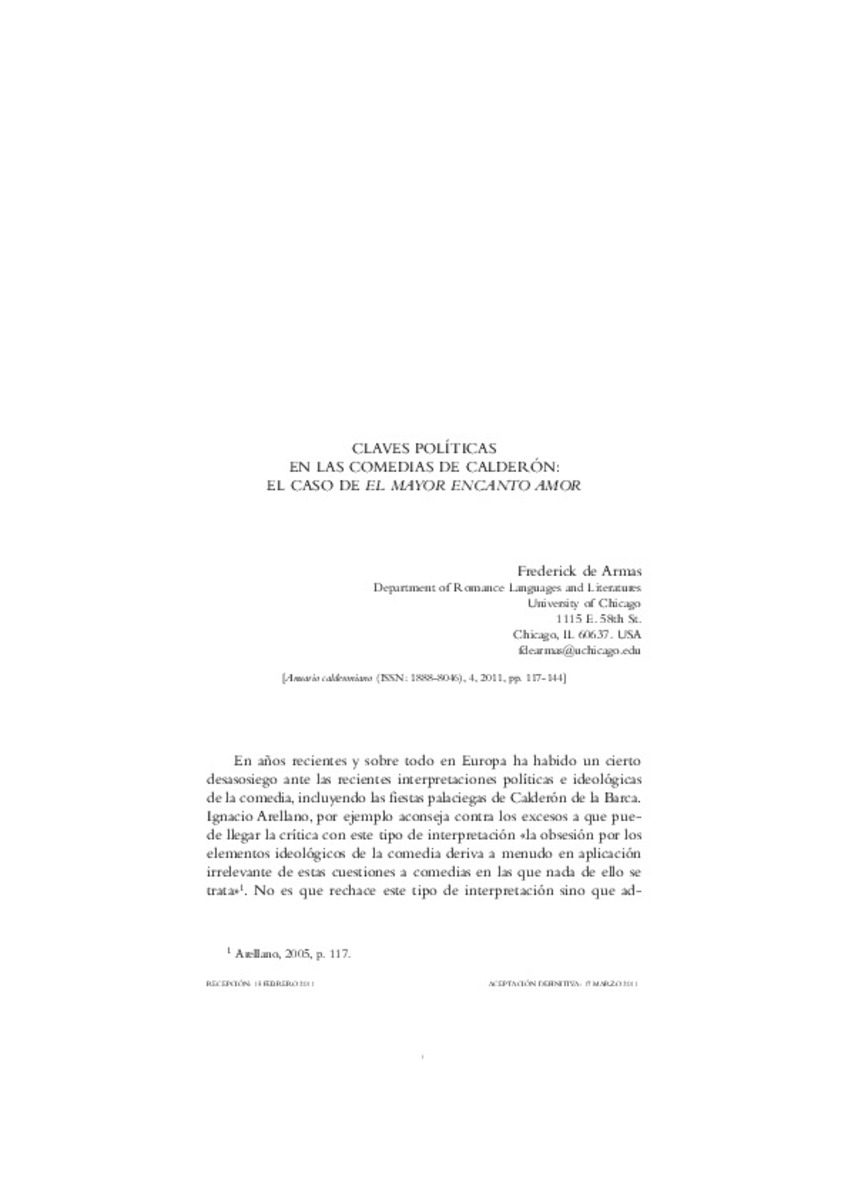Full metadata record
| DC Field | Value | Language |
|---|---|---|
| dc.creator | Armas, F.A. (Frederick A.) de | - |
| dc.date.accessioned | 2013-09-27T08:11:46Z | - |
| dc.date.available | 2013-09-27T08:11:46Z | - |
| dc.date.issued | 2011 | - |
| dc.identifier.citation | De Armas, Frederick, «Claves políticas en las comedias de Calderón: el caso de ‘El mayor encanto, amor’», Anuario Calderoniano, 4, 2011, pp. 117-144. | es_ES |
| dc.identifier.issn | 1888-8046 | - |
| dc.identifier.uri | https://hdl.handle.net/10171/29789 | - |
| dc.description.abstract | Este ensayo repasa la controversia sobre las interpretaciones políticas de la comedia mitológica de Calderón, ‘El mayor encanto, amor’. Mientras que algunos estudiosos han vislumbrado una crítica del conde-duque de Olivares tras la figura de la hechicera Circe, otros niegan tal posibilidad aduciendo el decoro necesario en el teatro de palacio. En este ensayo se ofrece una interpretación en tres niveles, teniendo en cuenta tres posibles auditorios. ‘El mayor encanto, amor’ puede interpretarse como obra laudatoria ya que incluye a la figura de Astrea. Es ella diosa de la justicia, verdad y castidad que señala el retorno de la edad de oro bajo el reinado de Felipe IV y su valido, el Conde-duque de Olivares. Para aquellos que formarían un auditorio más crítico, aunque prudente, la obra, aunque laudatoria, presentaría de manera decorosa una muy útil moraleja: el rey no puede dejarse entretener por los placeres en su nuevo palacio sino que debe participar activamente en el gobierno. Y en tercer lugar, aquellos que se mostraran descontentos con el privado, como la reina y sus damas, podrían entrever otros diseños en la obra. Aquí el privado se convertiría en Circe, así controlando con su poder y su magia al rey/Ulises.----------------------------------------------------------- This essay reviews the controversy over the political interpretations of Calderón’s mythological play, ‘El mayor encanto, amor’. While a number of scholars perceive a critique of the Count-Duke of Olivares through the characterization of the witch Circe, others deny such an interpretation noting that it would infringe upon the decorum needed for palace performances. This essay then offers three levels of interpretation, noting that there could be at least three kinds of audiences watching the play. ‘El mayor encanto, amor’ can be interpreted as a laudatory work since it includes the figure of Astraea. She is the goddess of justice, truth and chastity who signals the return of the mythical Golden Age during the times of Philip IV and his minister the Count-Duke of Olivares. However, a more critical yet prudent audience regards the play, although laudatory in nature, as presenting a useful piece of advice in a decorous manner: the king ought not to forget his governing duties while enjoying the pleasures of his new palace. Finally those that were discontented with the minister, such as the queen and her ladies, could perceive other designs in the work. Here, the minister would be metamorphosed into Circe who controlled the king/Ulysses through her power and magic. | es_ES |
| dc.language.iso | spa | es_ES |
| dc.publisher | GRISO - Universidad de Navarra | es_ES |
| dc.rights | info:eu-repo/semantics/openAccess | es_ES |
| dc.subject | Materias Investigacion::Filología y Literatura::Literatura | es_ES |
| dc.subject | Astrea | es_ES |
| dc.subject | Calderón | es_ES |
| dc.subject | Circe | es_ES |
| dc.subject | Comedia mitológica | es_ES |
| dc.subject | Duque de Olivares | es_ES |
| dc.subject | 'El mayor encanto, amor' | es_ES |
| dc.subject | Felipe IV | es_ES |
| dc.subject | Ulises | es_ES |
| dc.subject | Mythological play | es_ES |
| dc.subject | Ulysses | es_ES |
| dc.title | Claves políticas en las comedias de Calderón: el caso de ‘El mayor encanto, amor’ | es_ES |
| dc.type | info:eu-repo/semantics/article | es_ES |
| dc.type.driver | info:eu-repo/semantics/article | es_ES |
Files in This Item:
Statistics and impact
Items in Dadun are protected by copyright, with all rights reserved, unless otherwise indicated.






